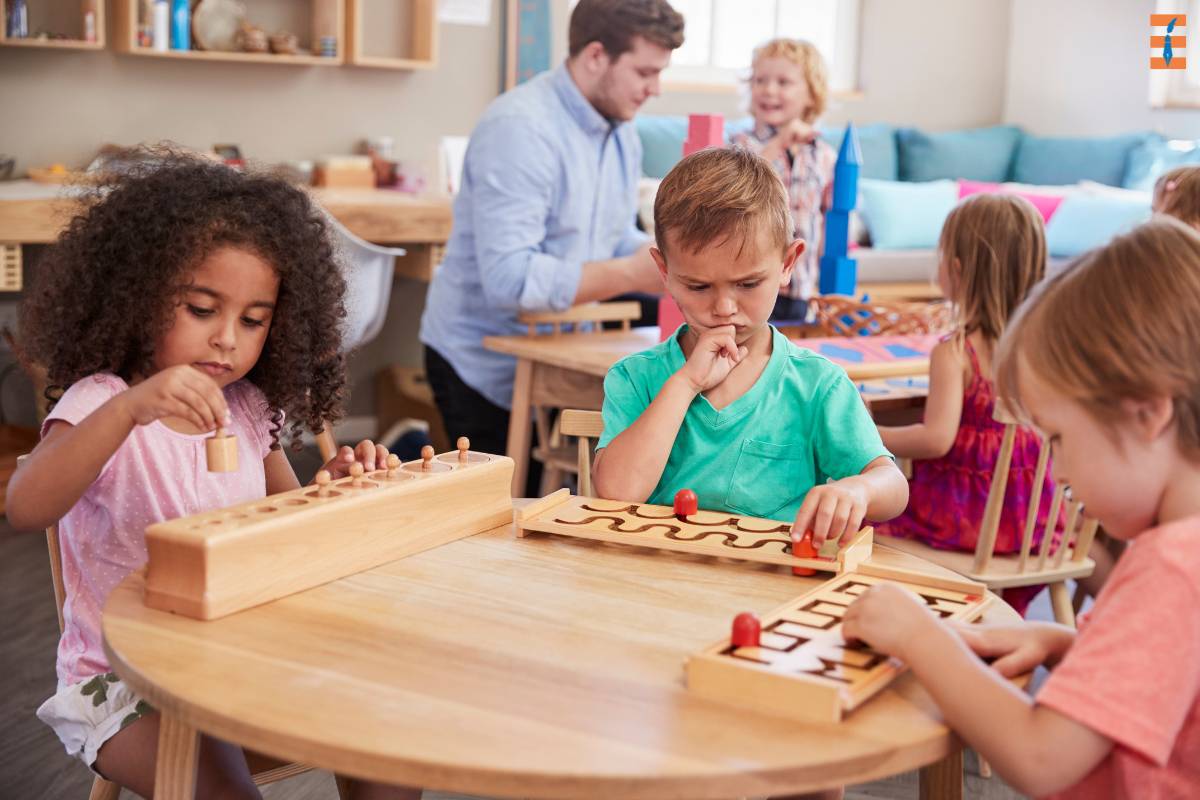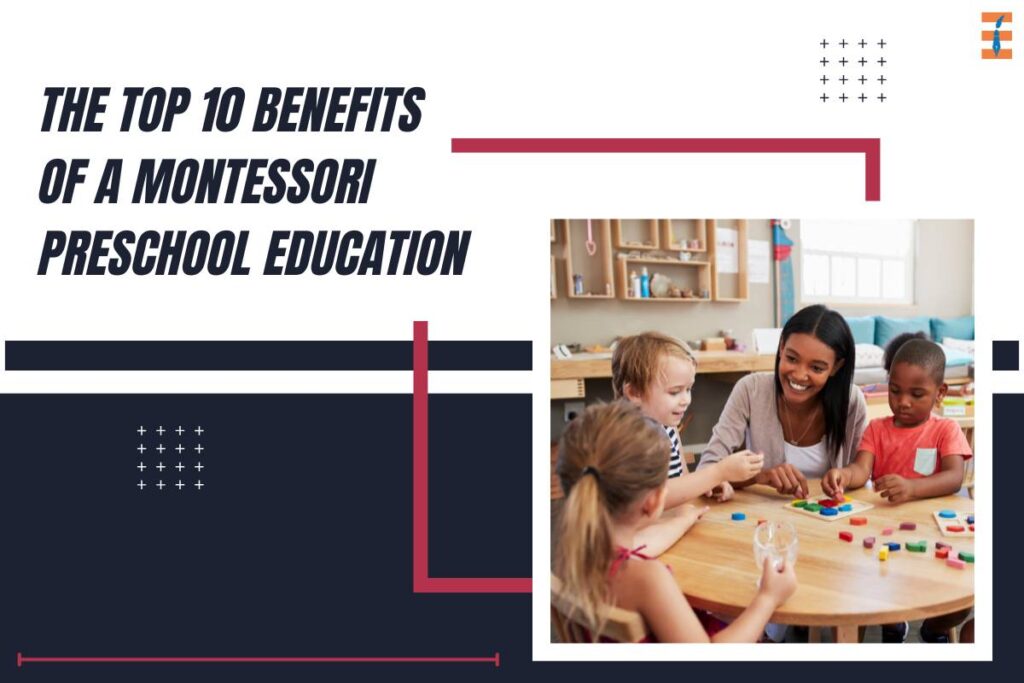Choosing the right preschool education for your child is a crucial decision that can significantly impact their development and future learning experiences. Among the various educational approaches available, Montessori preschool education stands out for its unique philosophy and proven benefits. Developed by Dr. Maria Montessori over a century ago, this child-centered educational approach has gained widespread recognition for fostering independent, confident, and curious learners.
In this article, we will explore the top 10 benefits of a Montessori preschool education and how it can positively influence your child’s growth and development.
Here are the Top 10 Benefits of a Montessori Preschool Education:
1. Fosters Independence
One of the core principles of Montessori preschool education is fostering independence. In a Montessori classroom, children are encouraged to choose their activities and work at their own pace. This autonomy helps children develop self-discipline and confidence in their abilities. They learn to manage their time, make decisions, and solve problems independently, which are essential life skills. By allowing children to take charge of their learning, Montessori preschool education helps them become self-reliant and capable individuals.
2. Encourages a Love of Learning

Montessori preschool education places a strong emphasis on experiential learning, where children actively engage with their environment through hands-on activities and exploration. By providing a rich and stimulating environment filled with developmentally appropriate materials, Montessori educators inspire children to follow their natural curiosity and pursue their interests. Unlike traditional education models that rely on memorization and repetition, Montessori students have the freedom to explore topics in-depth and at their own pace.
This approach not only fosters a deeper understanding of concepts but also cultivates a genuine enthusiasm for learning. Children derive immense satisfaction from the process of discovery and take pride in their accomplishments, laying the foundation for a lifelong love of learning. In a Montessori environment, education is not simply about acquiring knowledge but about fostering a passion for exploration, discovery, and intellectual growth that extends far beyond the preschool years.
3. Develops Social Skills
Social development is a critical aspect of Montessori preschool education. Montessori classrooms are typically mixed-age environments, where children of different ages learn together. This setup allows younger children to learn from older peers and older children to reinforce their knowledge by teaching younger classmates. Through collaborative activities and group work, children develop essential social skills such as communication, cooperation, and empathy. They learn to respect others’ perspectives, share resources, and work as part of a community.
4. Promotes Cognitive Development

Montessori preschool education is designed to support cognitive development through a well-structured curriculum that includes math, language, science, and cultural studies. The Montessori materials are specifically designed to enhance critical thinking and problem-solving skills. For example, children use manipulatives to understand mathematical concepts and engage in language activities that build vocabulary and grammar skills. This hands-on approach to learning helps children grasp abstract concepts more effectively and fosters a deep understanding of the subjects.
5. Enhances Fine and Gross Motor Skills
In Montessori preschool education, physical development is viewed as essential for overall well-being and learning readiness. The curriculum intentionally integrates activities that engage both fine and gross motor skills, recognizing the interconnectedness between physical movement and cognitive development. Fine motor skills are honed through precise tasks like drawing intricate patterns, manipulating small objects, and using tools such as scissors and tweezers.
These activities not only refine hand-eye coordination but also prepare children for tasks like writing and self-care. Meanwhile, gross motor skills are cultivated through dynamic activities such as climbing, jumping, and balancing on equipment in the outdoor play area. These activities promote strength, endurance, and spatial awareness, laying the foundation for activities like sports and outdoor exploration. By emphasizing physical activity as a core component of the curriculum, Montessori preschool education nurtures healthy bodies and supports holistic development in young learners.
6. Cultivates Concentration and Focus
Montessori preschool education places a strong emphasis on cultivating concentration and focus. The environment is carefully prepared to minimize distractions and provide children with the opportunity to engage deeply in their chosen activities. Montessori teachers observe and guide children to activities that match their developmental needs and interests, allowing them to concentrate for extended periods. This ability to focus is a critical skill that supports academic success and personal growth.
7. Nurtures Emotional Development
In Montessori preschool education, emotional development is not just an afterthought but a central focus. Teachers understand that a child’s emotional well-being lays the foundation for their overall growth and learning. Montessori classrooms are carefully designed to create a nurturing and empathetic environment where children can express themselves freely without fear of judgment. Through positive reinforcement and encouragement, teachers help children build a strong sense of self-worth and confidence.
Moreover, emotional intelligence is actively cultivated through various activities, such as group discussions, conflict resolution exercises, and mindfulness practices. By empowering children to recognize, understand, and manage their emotions, Montessori preschool education equips them with invaluable life skills that contribute to their social and emotional competence, resilience, and overall well-being.
8. Encourages Creative Expression

Creativity is highly valued in Montessori preschool education. The curriculum includes a wide range of activities that encourage creative expression, such as art, music, drama, and storytelling. Children are given the freedom to explore their creativity and express themselves in various ways. The Montessori environment supports creative thinking by providing open-ended materials and opportunities for imaginative play. This emphasis on creativity helps children develop problem-solving skills, innovation, and the ability to think outside the box.
9. Supports Individualized Learning
Montessori preschool education focuses on individualized learning, recognizing each child’s unique interests, strengths, and learning styles. Montessori teachers observe and tailor the learning experience to meet individual needs, ensuring appropriate challenges and personal progress. This personalized approach fosters independence, self-discipline, and a love of learning. Mixed-age classrooms promote peer learning and mentoring, while self-paced environments enhance concentration and confidence.
Montessori materials cater to various learning styles, making education hands-on and engaging. The approach nurtures intrinsic motivation, critical thinking, and problem-solving skills. By respecting each child’s growth rate and fostering strong parent-teacher communication, Montessori preschool education equips children with the tools to reach their full potential and become lifelong learners.
10. Prepares Children for Future Success
Montessori preschool education lays a robust groundwork for future academic and personal triumphs by nurturing essential skills and qualities crucial for success. In the Montessori environment, children cultivate a sense of independence, enabling them to take ownership of their learning journey and develop self-reliance. Moreover, the emphasis on critical thinking encourages children to explore, question, and analyze information independently, fostering a deeper understanding of concepts.
Social competence is also fostered through collaborative activities, promoting effective communication, empathy, and teamwork skills. With a strong emphasis on fostering a love of learning, Montessori education instills in children a lifelong curiosity and passion for knowledge. As a result, Montessori graduates often demonstrate outstanding academic performance, self-assurance, and a proactive approach to learning, setting them on a path toward success in various facets of life, both academically and personally.
Conclusion
Choosing a Montessori preschool education for your child can provide them with a rich and fulfilling learning experience that supports their overall development. The unique principles and practices of the Montessori approach, such as fostering independence, encouraging a love of learning, promoting social and cognitive development, and nurturing emotional well-being, offer numerous benefits that extend far beyond the preschool years. By investing in a Montessori preschool education, you are giving your child the opportunity to develop into a confident, capable, and well-rounded individual, ready to thrive in the future.
Also Read: Nurturing Young Minds: Engaging and Educational Activities for Preschoolers

